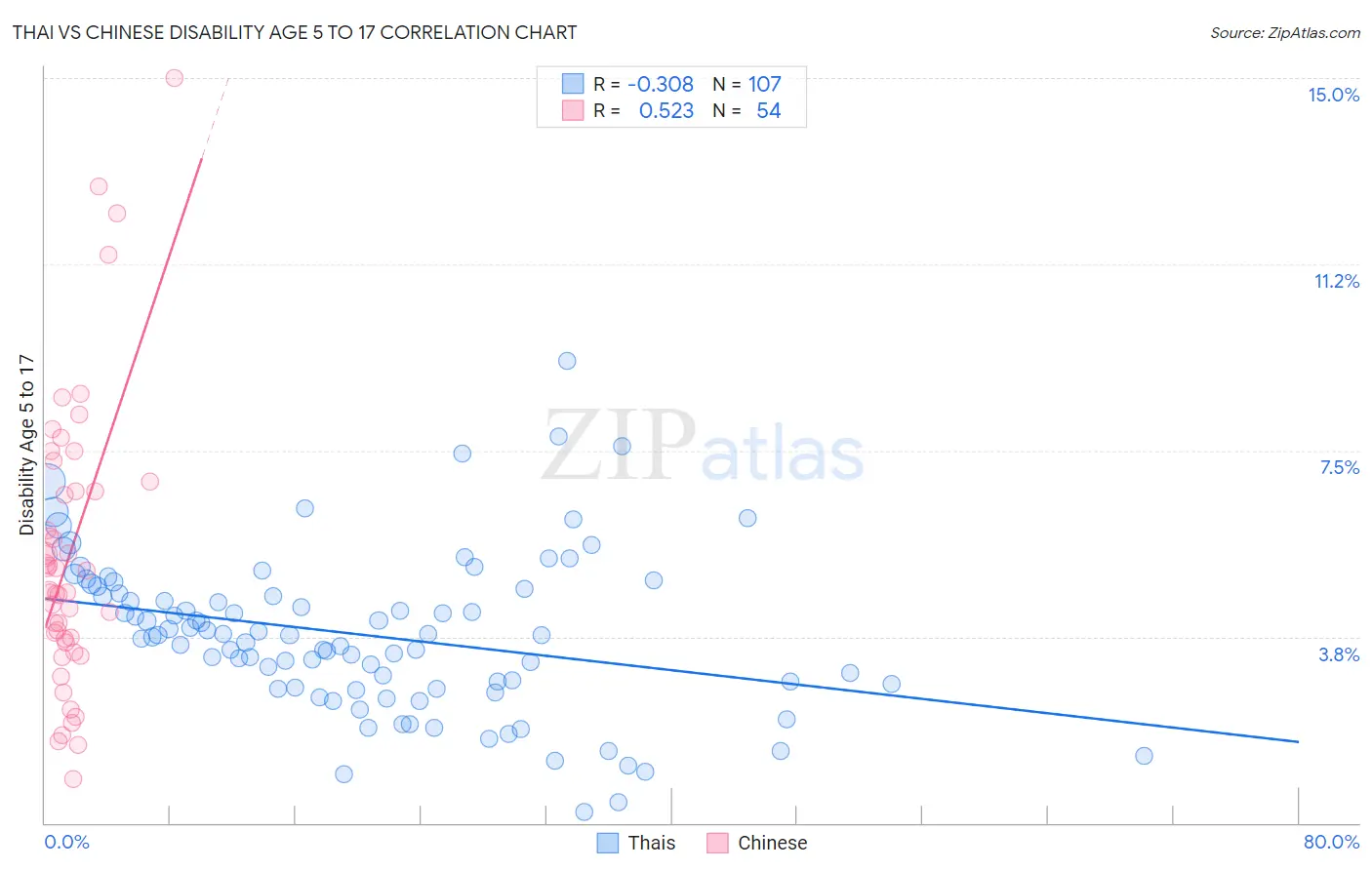Thai vs Chinese Disability Age 5 to 17
COMPARE
Thai
Chinese
Disability Age 5 to 17
Disability Age 5 to 17 Comparison
Thais
Chinese
4.7%
DISABILITY AGE 5 TO 17
100.0/ 100
METRIC RATING
13th/ 347
METRIC RANK
4.7%
DISABILITY AGE 5 TO 17
100.0/ 100
METRIC RATING
15th/ 347
METRIC RANK
Thai vs Chinese Disability Age 5 to 17 Correlation Chart
The statistical analysis conducted on geographies consisting of 470,579,887 people shows a mild negative correlation between the proportion of Thais and percentage of population with a disability between the ages 5 and 17 in the United States with a correlation coefficient (R) of -0.308 and weighted average of 4.7%. Similarly, the statistical analysis conducted on geographies consisting of 64,726,058 people shows a substantial positive correlation between the proportion of Chinese and percentage of population with a disability between the ages 5 and 17 in the United States with a correlation coefficient (R) of 0.523 and weighted average of 4.7%, a difference of 0.91%.

Disability Age 5 to 17 Correlation Summary
| Measurement | Thai | Chinese |
| Minimum | 0.21% | 0.88% |
| Maximum | 9.3% | 15.0% |
| Range | 9.1% | 14.1% |
| Mean | 3.8% | 5.4% |
| Median | 3.8% | 4.9% |
| Interquartile 25% (IQ1) | 2.7% | 3.7% |
| Interquartile 75% (IQ3) | 4.7% | 6.7% |
| Interquartile Range (IQR) | 2.0% | 3.0% |
| Standard Deviation (Sample) | 1.6% | 2.9% |
| Standard Deviation (Population) | 1.6% | 2.8% |
Demographics Similar to Thais and Chinese by Disability Age 5 to 17
In terms of disability age 5 to 17, the demographic groups most similar to Thais are Immigrants from Korea (4.7%, a difference of 0.70%), Iranian (4.6%, a difference of 1.1%), Armenian (4.6%, a difference of 1.3%), Immigrants from Singapore (4.7%, a difference of 1.3%), and Immigrants from India (4.6%, a difference of 1.5%). Similarly, the demographic groups most similar to Chinese are Immigrants from Korea (4.7%, a difference of 0.20%), Immigrants from Singapore (4.7%, a difference of 0.42%), Arapaho (4.7%, a difference of 0.88%), Immigrants from South Central Asia (4.7%, a difference of 0.90%), and Immigrants from Uzbekistan (4.8%, a difference of 1.4%).
| Demographics | Rating | Rank | Disability Age 5 to 17 |
| Filipinos | 100.0 /100 | #4 | Exceptional 4.3% |
| Immigrants | Iran | 100.0 /100 | #5 | Exceptional 4.4% |
| Immigrants | Israel | 100.0 /100 | #6 | Exceptional 4.5% |
| Immigrants | China | 100.0 /100 | #7 | Exceptional 4.5% |
| Indians (Asian) | 100.0 /100 | #8 | Exceptional 4.6% |
| Immigrants | Eastern Asia | 100.0 /100 | #9 | Exceptional 4.6% |
| Immigrants | India | 100.0 /100 | #10 | Exceptional 4.6% |
| Armenians | 100.0 /100 | #11 | Exceptional 4.6% |
| Iranians | 100.0 /100 | #12 | Exceptional 4.6% |
| Thais | 100.0 /100 | #13 | Exceptional 4.7% |
| Immigrants | Korea | 100.0 /100 | #14 | Exceptional 4.7% |
| Chinese | 100.0 /100 | #15 | Exceptional 4.7% |
| Immigrants | Singapore | 100.0 /100 | #16 | Exceptional 4.7% |
| Arapaho | 100.0 /100 | #17 | Exceptional 4.7% |
| Immigrants | South Central Asia | 100.0 /100 | #18 | Exceptional 4.7% |
| Immigrants | Uzbekistan | 100.0 /100 | #19 | Exceptional 4.8% |
| Burmese | 100.0 /100 | #20 | Exceptional 4.8% |
| Yup'ik | 100.0 /100 | #21 | Exceptional 4.8% |
| Asians | 100.0 /100 | #22 | Exceptional 4.8% |
| Immigrants | Bolivia | 100.0 /100 | #23 | Exceptional 4.8% |
| Immigrants | Lebanon | 100.0 /100 | #24 | Exceptional 4.8% |